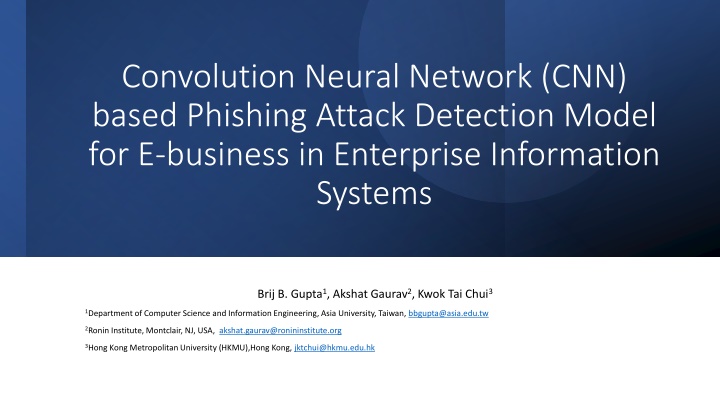
Advanced Phishing Attack Detection Model Using CNN
Discover how a Convolutional Neural Network (CNN) based phishing attack detection model is revolutionizing E-business security. This innovative approach tackles the evolving threats of sophisticated phishing attacks using deep learning techniques. By leveraging CNN's pattern recognition capabilities, this model proactively defends E-businesses from potential financial losses and reputational damage. Explore the motivation, proposed approach, simulation environment, data preprocessing, and impressive accuracy and loss curves of this cutting-edge solution. Dive into the classification report and confusion matrix for a comprehensive understanding of its performance. Join us in fortifying online security and safeguarding customer trust with this advanced model.
Download Presentation

Please find below an Image/Link to download the presentation.
The content on the website is provided AS IS for your information and personal use only. It may not be sold, licensed, or shared on other websites without obtaining consent from the author. If you encounter any issues during the download, it is possible that the publisher has removed the file from their server.
You are allowed to download the files provided on this website for personal or commercial use, subject to the condition that they are used lawfully. All files are the property of their respective owners.
The content on the website is provided AS IS for your information and personal use only. It may not be sold, licensed, or shared on other websites without obtaining consent from the author.
E N D
Presentation Transcript
Convolution Neural Network (CNN) based Phishing Attack Detection Model for E-business in Enterprise Information Systems Brij B. Gupta1, Akshat Gaurav2, Kwok Tai Chui3 1Department of Computer Science and Information Engineering, Asia University, Taiwan, bbgupta@asia.edu.tw 2Ronin Institute, Montclair, NJ, USA, akshat.gaurav@ronininstitute.org 3Hong Kong Metropolitan University (HKMU),Hong Kong, jktchui@hkmu.edu.hk
Introduction Phishing attacks are a persistent threat to E-business and Enterprise Information Systems. They involve deceptive tactics to steal sensitive information, endangering organizations and individuals. We explore a novel approach using Convolutional Neural Networks (CNNs) to combat phishing attacks.
Motivation Phishing attacks are becoming more sophisticated and prevalent. Traditional rule-based detection methods are less effective against these evolving threats. Phishing attacks can lead to severe consequences, including financial loss and damage to reputation. CNNs offer a promising solution, excelling at pattern recognition in images and text. We aim to develop a CNN- based model to proactively defend E-businesses and protect customer trust.
Proposed Approach
Simulation Environment For deep learning, we employed PyTorch, a popular open-source machine learning framework. Specifically, our model was implemented using PyTorch version 2.0.0, taking advantage of its extensive libraries and deep learning functionalities. We harnessed the computational resources and data access capabilities of Kaggle notebooks to facilitate our model development and experimentation. Kaggle notebooks provide an interactive and collaborative Python environment, which was instrumental in streamlining our research process.
Data Preprocessing Column Removal Data Data Loader Creation Data Splitting Normalization
Accuracy and Loss Curves
Classification Report
Confusion Matrix
Conclusion In this research, we introduced a Phishing Attack Detection Model built on top of a Convolutional Neural Network (CNN) and optimized for use in online businesses. Training results show it is quite good at learning and generalizing from the data supplied, with a loss of only 0.077525 and an accuracy of 0.972125. Its test loss was 0.090748, and its test accuracy was 0.967262, further demonstrating its superiority in detecting phishing attempts in realistic E-business settings.






















